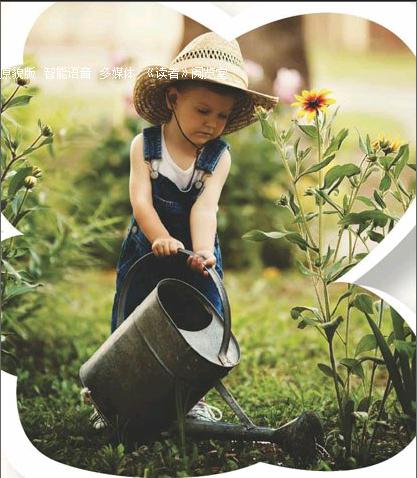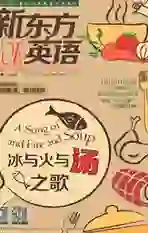花语者
2017-10-15ByDahliaLithwick译/常晨
By+Dahlia+Lithwick+译/常晨



I was raised in a greenhouse. My mother, born of Iraqi Jews who had migrated to India, married a Canadian who brought her home to a glass house in Ottawa. As a toddler, I barely noticed that most of the house was made of windows, but it wasnt me paying the heating bills. What I did notice was that every window was always and forever mounded with plants. Delicate African violets and cactuses1) bloomed, and avocado2) trees stood sentry3) over the living room. They must all have been as baffled by the endless Canadian winters as my mother. But more pressing in my memory, we were running a plant infirmary4) at my house, in which root tipping, stem reinforcing, and plant healing happened in tiny glass jars and chipped mugs on every windowsill.
It was as if my brothers and I had a whole host of plant half-siblings guiding us through our childhoods, hopping along on their little plant wheelchairs and slings and crutches.
Of course when I started college, I bought plants for my dorm rooms, and I even have a vague, blurred memory of my mother once walking me through a root transplant over the phone, in the manner of Hawkeye Pierce on M.A.S.H., talking some rookie5) surgeon through an amputation6) by walkie-talkie7). When my parents finally moved to the desert, my mothers green world exploded into the outdoors. Suddenly there was jasmine, and hibiscus, and lemon trees so fat with fruit the neighbors would come by with shopping bags. Plants outside the house! If I call her and the phone rings and rings, it just means my mom is out in her garden, snapping off dried leaves and picking out tiny weeds and doing something with something that will someday bloom into something extraordinary.
Then came the plant she gave me when my first son was being born. A painful and violent labor8) turned into a painful and violent delivery9) and then got worse. It was going so badly that when my parents left the hospital the first night, my mother tore the printed message off the top of the little card theyd stuck in the plant at the hospital gift shop that had read “Welcome new baby” or some such. A joyous welcome was no longer certain. A few hours later, soon after Coby emerged, I saw a new, flowering plant by my bed and only the torn bottom half of a card.
I took out the worst of my postpartum10) derangement11) syndrome on that poor plant. I couldnt help but wonder how my mother imagined I could take care of a tiny white flowering plant over and above the colicky, deranged, sleepless bucket-of-hair that came out of me crying and couldnt stop for three-and-a-half months (but whos counting?). I wanted to drown that plant. Taking care of it was too much to ask of me.endprint
My son did stop crying, but only after my mother sat up rocking him all night long, so my husband and I could sleep for a few hours and not phone the divorce attorneys. Eight-and-a-half years later, the plant still blooms in an upstairs dormer window12). I forget to water it and it lives, I overwater it and it coughs up a lung and then thrives again. Tiny white flowers greet me almost every morning, despite my best efforts to forget it. I once dragged my mother over to the plant and demanded that she explain why it looked so droopy13) in places.
“Yes, they do that,” she said.
Even with its perilous beginnings, that plant is the most precious thing my mother has ever given me. Most of what I know about parenting and patience and life Ive learned by watching it. Of my kids, I now mostly think, “Yes, they do that.” At some point, I asked my mother what this type of plant is called, and she said, “Its a Grandma Rose plant,” because my grandmother, her mother-in-law, had loved them so much. When my son turned 3, he planted strawberries all over the backyard garden, and they produce similarly tiny white flowers that—I secretly hope, every spring—might just grow into my Grandma Rose.
My second son, Sopher, was born without a plant entourage14) but with a green thumb15) in his mouth. He started popping seeds into the garden as soon as he could toddle, and the row dedicated to “peas” is still labeled “pesa” because he was 4 and couldnt spell, and really, shouldnt they have been called pesa in the first place? Last summer, when he was 5, Sopher and I ended up in Home Depot or Lowes or one of those huge “home improvement” stores with no windows anywhere, and he circled four times around a rack of broken, dead, and diseased plants generously described by a sign as “lonely plants” but largely marked by their crypt-like odor. He begged for one. We now have three. He waters them and names them and tells me he is the “plant whisperer,” just like his grandmother.
His sunflower grew so big it finally fell over. His tomatoes are still glorious. Even the pesa. I worry that the neighbors will come with shopping bags for the pesa. I watch him out there in wonder.
Voltaire16) famously concluded Candide with the advice, “But let us cultivate our garden.” He understood that there is something about caring for the plant world that makes us more apt to behave well in the human world. One has the notion that things raised in hothouses come out delicate and fragile. But I think the opposite is true: I think they are raised with an understanding of how life runs deep and sure and all around.endprint
We consider ourselves a green family. Prius17), check. Compost18) heap check. But I dont shiver in anticipation at the thought of splitting tubers19) or transplanting peonies20), as my mother does. She reminds me what it is to be of the earth and to fight for the Earth, not by way of bumper stickers and committee meetings and petitions, but by just planting and tending and weeding and never giving up on even a broken bit of spider plant21). I see that in my son now, too—happy with dirt in his green rubber boots and a watering can and a watermelon seed. When I go to visit my parents, my first stop is my mothers garden. When his lonely plant goes yellow at the edges, my son asks to put in a call to his grandparents. The earth and the garden have rooted us all to one another when nobody was looking. We cultivate our garden and let life take it from there.
在忙碌、紧张的生活中,养花可谓一种不错的身心愉悦方式。我们种植、浇水、松土,培育出属于自己的小小花园,让心灵得到陶冶和治愈,让生命得到滋养和丰富。
我是在温室里长大的。我的母亲是一个在伊拉克出生的犹太人,后来移民到印度,嫁给了一个加拿大人。这个加拿大人把她带回家——渥太华的一所玻璃房子中。在我蹒跚学步时,我并没有注意到房子的大部分是由玻璃窗组成的,毕竟付暖气费的不是我。但我确实注意到,每个窗户前总是且永远摆满了植物。娇美的非洲紫罗兰和仙人掌吐露着芬芳,鳄梨树如哨兵般保卫着客厅。它们肯定和我的母亲一样,不明白为什么加拿大的冬天没有尽头。然而,让我记忆最为深刻的是,我们家经营了一个植物医务室,在这里,每个窗台上都有小小的玻璃瓶和豁了口的杯子,植物们在里面生根、长茎、愈合。
我和我的兄弟们好似拥有一大群植物兄弟姊妹,陪我们走过童年,我们在植物中嬉戏玩耍,把它们当成小轮椅、吊索和拐杖。
开始上大学时,我就买了些花花草草放在宿舍房间里。我甚至还模糊地记得,妈妈有一次打电话指导我进行嫁接,就像美剧《陆军野战医院》里鹰眼·皮尔斯通过对讲机指导一个新手医生进行截肢手术一样。当父母最终搬进了沙漠中时,妈妈的绿色世界一下子拓展到了户外。忽然间就有了茉莉花、木槿,还有高产的柠檬树,高产到邻居们都带着购物袋来摘柠檬。植物种到户外啦!如果我打电话给妈妈,电话一遍一遍地响而没人接,那就意味着她正在花园里摘枯叶、除杂草,拿着某种工具在培育某种植物——有一天这种植物会繁花盛开、大放异彩。
我第一个儿子出生时,妈妈给了我一盆植物。我经历了痛苦而又剧烈的分娩和生产过程,之后情况变得更糟。由于情况非常糟糕,在第一天夜里我父母离开医院时,妈妈把他们在医院礼品店买的夹在植物里的小卡片的顶部撕掉了,那上面印有“欢迎小宝贝”或诸如此类的文字。我们甚至都不确定能否开心地迎接这个新生命。几个小时之后,科比出生了,之后没过多久,我就在床边看到了一棵新的开花植物和撕得只剩一半的卡片底部。
因为产后紊乱综合征,我的坏脾气都撒在了那棵可怜的植物上。我忍不住想知道,妈妈是怎么想的,我怎么可能在照顾一个患有腹绞痛、吵闹、不眠不休、打娘胎里出生就一直哭了三个半月(可是谁又在数呢?)的小毛孩的同时,还能去照顾一盆娇小的白花植物。我真想淹死这盆植物。让我照顾它,对我来说,要求太高了。
我儿子后来不再哭了,但那是在我妈妈熬夜摇了他一整晚之后。这样我和我老公才得以睡上几个小时,而不至于去给离婚律师打电话。八年半之后,这盆白花仍然在楼上的天窗旁绽放着。我忘记浇水,它活着;我浇水过多,它呛着水挣扎一阵子,然后又欣欣向荣了。几乎在每个清晨,小白花都在向我问候,尽管我尽最大努力去忘记它。有一次,我拉着我妈妈去看这棵白花,让她跟我解释一下为什么这棵花有的地方看起来没精打采。
“是的,它们有时就是这样子。”她讲道。
尽管小白花一开始的时候生命堪忧,但是这盆花成了妈妈给我的最珍贵的礼物。关于为人母、耐心和生命的大部分感悟,我都是通过观察这盆小白花获得的。关于我的孩子们,我现在很多时候都这样想,“是的,他们就是这样子。”有一次,我问妈妈这种植物叫什么,她说:“这叫祖母玫瑰。”因为我的祖母,也就是妈妈的婆婆,非常喜爱这种花。我儿子三岁的时候,他在后院花园里种满了草莓。草莓也有着同样娇小的白色花朵。每个春天,我都暗暗地希望,这些白色花朵会长成祖母玫瑰。
我第二个儿子索菲尔出生时,没有植物保驾护航,但是他有着种花的天赋。刚会蹒跚走路,他就能把种子扔到花园里。当时用来种“豆子”的这一畦被称为“豆之”,因为四岁的他还不会拼写,不过说真的,难道豆子最开始不應该叫“豆之”吗?去年夏天,索菲尔五岁的时候,我和他去了家得宝还是劳氏之类的连一扇窗户都没有的大型家居装饰商场。索菲尔绕着一架萎靡、凋零、奄奄一息的植物转了四圈。这些植物被“善意”地打上“孤独的植物”的标签,但其地窖般的气味相比其“孤独”气质更为突出。他恳求我买一棵。现在我们有了三棵。他给这些植物浇水、起名字,还跟我说他是“花语者”,和姥姥一样。endprint
他的向日葵长得非常大,最后都栽倒了。他的西红柿依旧生机勃勃。还有豆之。我都担心邻居们会拿着购物袋来要豆之。我惊奇地看着他在户外劳作。
伏尔泰的作品《老实人》 有一句著名的结尾,同时也是一句金玉良言——“但是,让我们培育我们的花园。”他知道,关爱植物世界使我们更容易在人类世界中举止得体。有人认为温室中的植物娇嫩柔弱。但是,我认为事实恰恰相反:我认为温室里的植物明白生命的深邃、必然和广阔。
我们自认为是绿色环保家庭。混合动力车,我们开。堆肥,我们也用。但是我们还没有达到妈妈那种程度,她一预想到要给土豆分茎或是嫁接牡丹就会激动得发抖。妈妈提醒我,什么叫成为地球的一分子并为地球而战,并不是通过贴保险杠贴纸、参加委员会会议和请愿,而是通过种植、照料、除草以及决不放弃哪怕是一根破败的吊兰。现在,我在儿子的身上也看到了这一点——他穿着自己的绿色橡胶鞋,拿着喷壶和西瓜种子,开开心心地在泥土里耕耘。每次我去看父母,都得先看看妈妈的花园。当儿子那些“孤独的植物”的叶边发黄的时候,他会让我给姥姥姥爷打电话求助。不经意间,大地和花园已让我们紧紧联系在一起。我们培育我们的花园,让生命从这里得到滋养。
1.cactus [?k?kt?s] n. 仙人掌科,仙人掌
2.avocado [??v??kɑ?d??] n. 鳄梨,鳄梨树
3.sentry [?sentri] n. 哨兵;岗哨
4.infirmary [?n?f??(r)m?ri] n. (学校及其他机构中的)医务室
5.rookie [?r?ki] n. (无经验的)新手,生手
6.amputation [??mpj??te??(?)n] n. 截肢;切断(术)
7.walkie-talkie [?w??ki?t??ki] n. (便携式)步话机
8.labor [?le?b?(r)] n. 分娩
9.delivery [d??l?v(?)ri] n. 分娩
10.postpartum [?po?st?pɑ?rt?m] adj. 产后的
11.derangement [d??re?nd?m?nt] n. 紊乱
12.dormer window:屋顶窗,天窗
13.droopy [?dru?pi] adj. 耷拉着的
14.entourage [??nt??rɑ??] n. 随从
15.green thumb:精湛的种植花木和蔬菜的技能
16.Voltaire:伏尔泰(1694~1778),法国启蒙思想家、哲学家、作家、历史学家
17.Prius:普锐斯,是丰田汽车的一个创新产品,属于典型的混合动力汽车。
18.compost [?k?mp?st] n. 堆肥
19.tuber [?tju?b?(r)] n. (馬铃薯等植物的)块茎
20.peony [?pi??ni] n. 牡丹;芍药
21.spider plant:吊兰endprint
